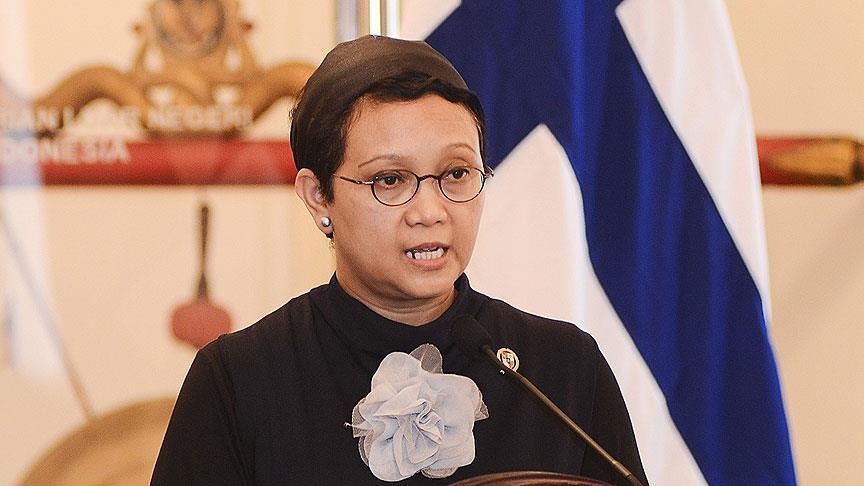Indonesian FM to visit Bangladesh after Rakhine meet
To discuss Rohingya refugees with Bangladeshi counterpart after attending Myanmar meeting to address violence in Rakhine
 Indonesian Foreign Minister Retno Marsudi
Indonesian Foreign Minister Retno Marsudi
By Ainur Rohmah
TUBAN, Indonesia
Indonesia's foreign minister announced Saturday plans to visit Bangladesh to discuss Rohingya Muslim refugees following a regional meeting hosted by Myanmar to address recent violence in western Rakhine State.
Myanmar has invited foreign ministers from Southeast Asian nations for Dec. 19 talks in an effort to reduce regional concerns over a situation in northern Rakhine in which anything from 76 to 400 Rohingya Muslims have died.
A military crackdown in Rakhine that followed Oct. 9 attacks on police stations has raised concerns among ASEAN (Association of Southeast Asian Nations) countries, especially in predominantly Muslim Indonesia and Malaysia.
On Saturday, Indonesia’s top diplomat Retno Marsudi was quoted by metrotvnews.com as saying, “I'm going to Bangladesh after Myanmar to meet with Bangladesh’s foreign minister to talk about refugees."
She stressed that Indonesia wants to comprehensively address problems related to Rohingya fleeing along the Myanmar-Bangladesh border, adding that all countries attending the meeting in Myanmar’s largest city Yangon should freely express their opinions.
"During the summit, all can freely express their opinion on Rakhine. So this is not a rigid agenda," she said.
Marsudi underlined that Indonesia would focus on asking Myanmar to open up Rakhine to humanitarian aid and assistance so the situation does not deteriorate for civilians in the impoverished area.
On Dec. 8, the deputy director general at Myanmar's Ministry of Foreign Affairs, Aye Aye Soe, highlighted to Anadolu Agency that a pledge by Marsudi to help Myanmar resolve all conflicts between the Buddhist and Muslim communities in Rakhine was both “positive and constructive”.
Myanmar has said that at least 93 people -- 17 police and soldiers and 76 alleged "attackers" (including six who reportedly died during interrogation) -- were killed and some 575 suspects detained in the Oct. 9 attacks and a subsequent military crackdown.
Rohingya advocacy groups, however, claim around 400 Rohingya -- described by the United Nations as among the most persecuted groups worldwide -- were killed in the military operations, women were raped and Rohingya villages torched.
On Friday, the UN’s High Commissioner for Human Rights warned the Myanmar government that its “short-sighted, counterproductive, even callous” approach to handling the crisis could result in “grave long-term repercussions” for the country and the region.
“The repeated dismissal of the claims of serious human rights violations as fabrications, coupled with the failure to allow our independent monitors access to the worst affected areas in northern Rakhine, is highly insulting to the victims and an abdication of the Government’s obligations under international human rights law,” Zeid Ra’ad Al Hussein said in a statement.
Expressing “deep” disappointment that the UN Human Rights Office’s requests for access had not received approval, he added: “If the authorities have nothing to hide, then why is there such reluctance to grant us access? Given the continued failure to grant us access, we can only fear the worst.”
Anadolu Agency website contains only a portion of the news stories offered to subscribers in the AA News Broadcasting System (HAS), and in summarized form. Please contact us for subscription options.







